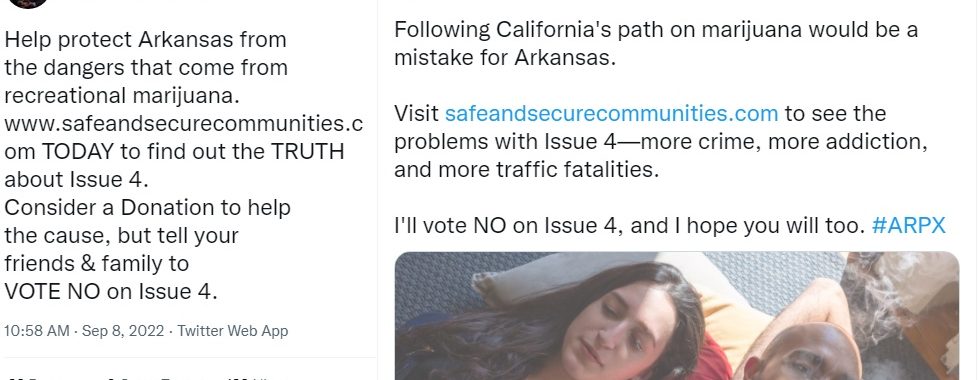Last week Arkansas Governor Asa Hutchinson, former Governor Mike Huckabee, Lt. Governor Tim Griffin, and U.S. Senator Tom Cotton issued statements opposing Issue 4, a proposed constitutional amendment that would legalize marijuana in Arkansas.
Sen. Cotton’s statement notes that Issue 4 would lead to more crime, more addiction, and more traffic fatalities.
Gov. Huckabee’s highlights the dangers that so-called “recreational marijuana” would bring to Arkansas.
Lt. Gov. Griffin’s statement touches on the ways marijuana affects the job market.
Gov. Hutchinson’s statement points out that legalizing marijuana leads to increased use among minors.
All statements are below:
As we have written before, legalizing marijuana does not appear to reduce drug crime.
If anything, illicit drugs — including illegal marijuana — appear to be a bigger problem in states where marijuana has been legalized.
Last week NBC News reported that illegal marijuana farms are a major problem in California despite legalization. These operations allegedly are operated by drug cartels and tied to human trafficking and other crimes.
In a single raid at one illegal marijuana farm, authorities in California seized over 100,000 marijuana plants and upwards of $10 million cash as well as millions of dollars in infrastructure and equipment.
In 2020 law enforcement in Colorado seized 5.54 tons of illicit marijuana intended for the black market.
Industrial-size, illegal marijuana farms have inundated southern Oregon despite legalization there as well.
In Colorado, authorities report that traffic deaths involving drivers who tested positive for marijuana have increased 138% since marijuana was legalized in 2012.
A report published in the Journal of the American Medical Association found that states that legalized commercial marijuana sales saw self-harm rates rise by 46% among men ages 21 to 39.
A growing body of research shows marijuana can have damaging effects on adolescent brains — including permanent loss in IQ, difficulty thinking and problem-solving, reduced coordination, and increased risk of psychosis.
As we have said in the past, Issue 4 — the proposed marijuana amendment — makes sweeping changes to Arkansas’ constitution and state laws.
It repeals, replaces, and rewrites several parts of Arkansas’ medical marijuana amendment that voters passed in 2016, it adds new language to other parts of the Arkansas Constitution, and it drastically expands marijuana in every community in Arkansas.
It is unclear just how far-reaching some of these changes may be.
Articles appearing on this website are written with the aid of Family Council’s researchers and writers.
READ MORE




